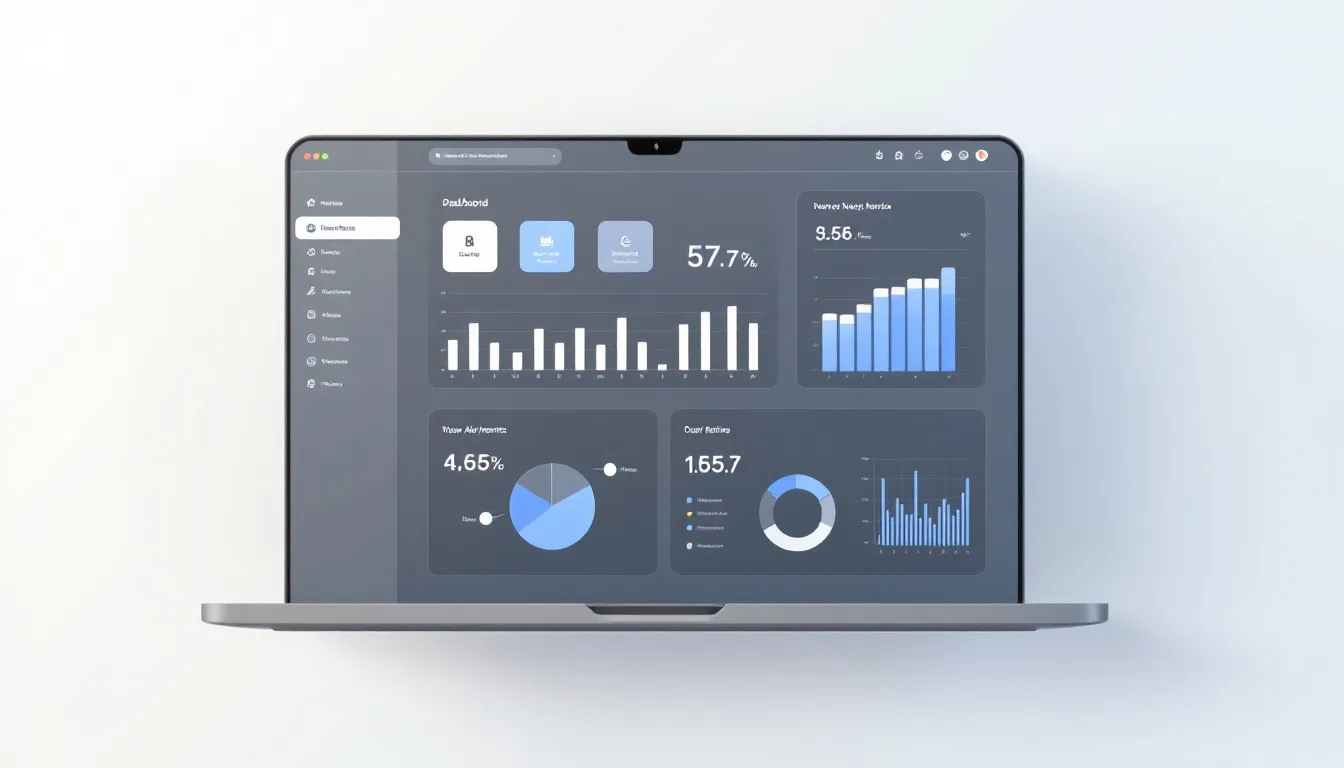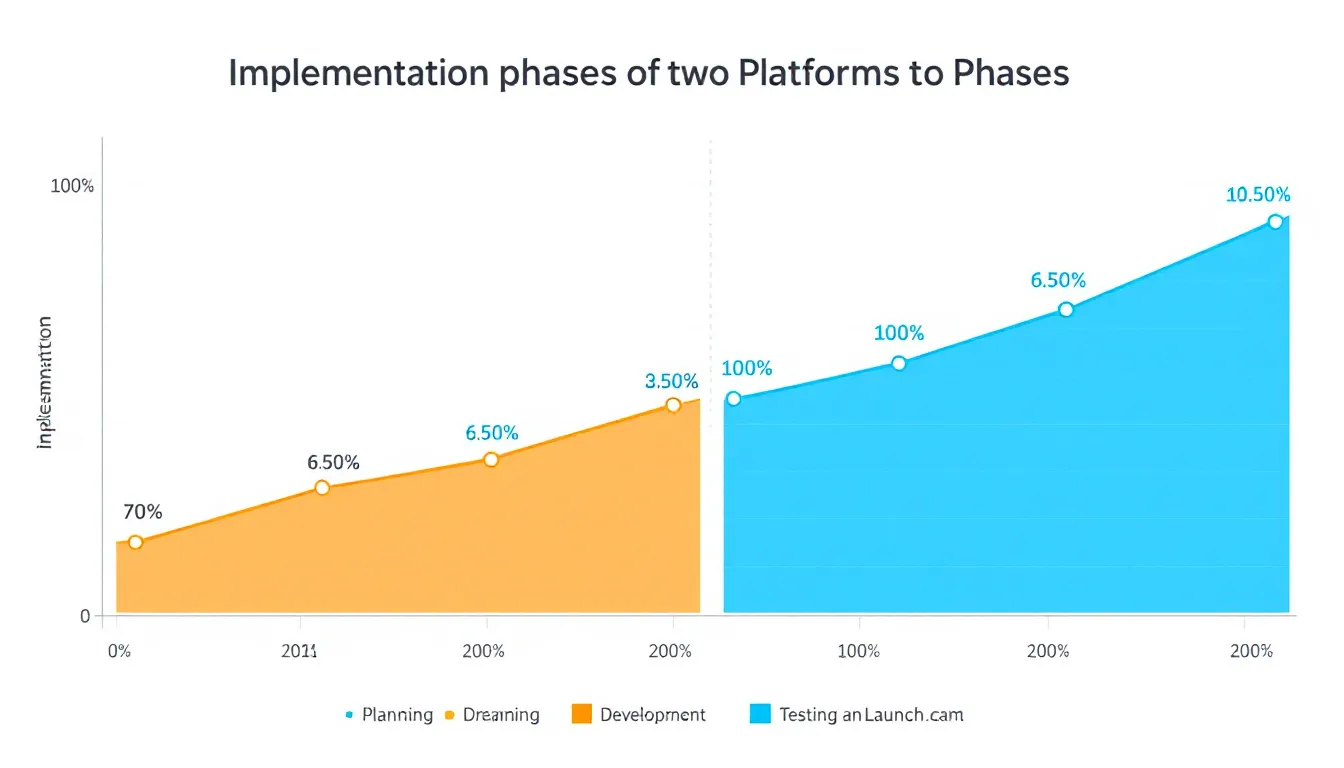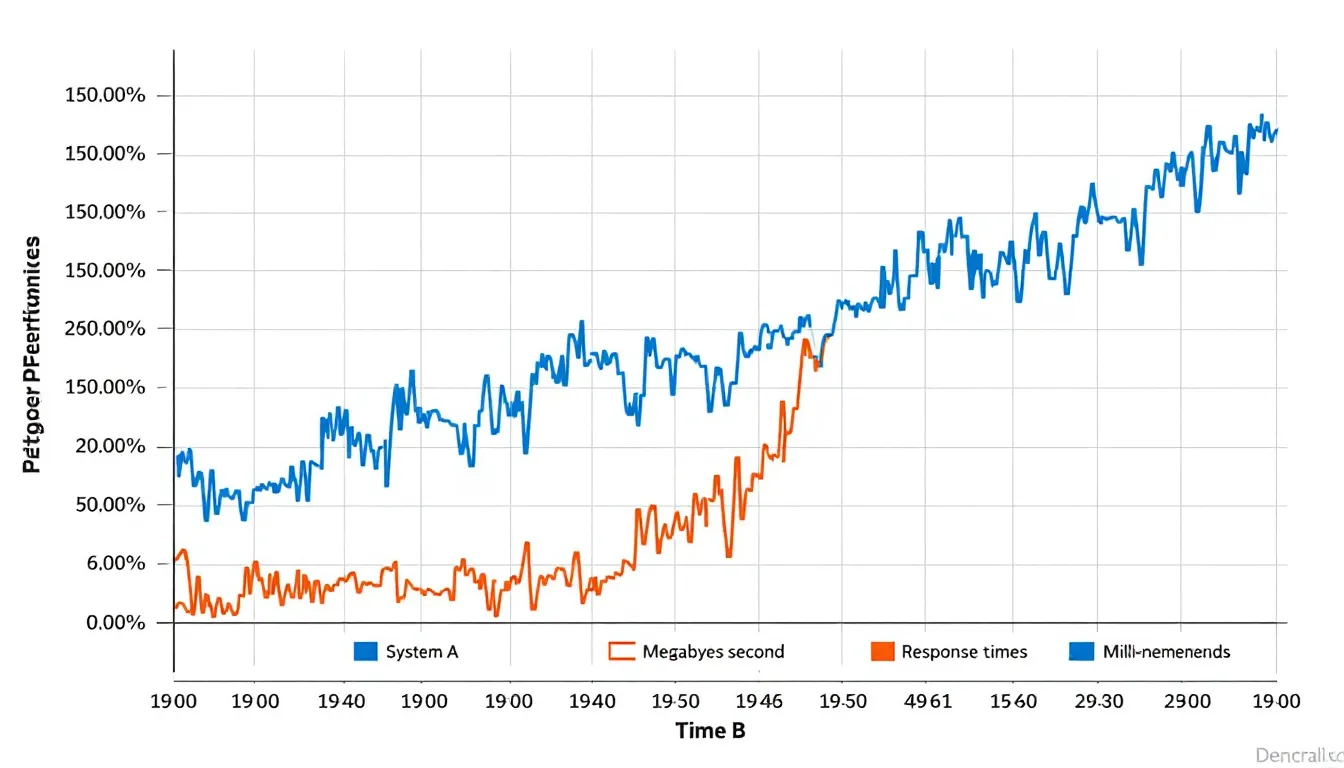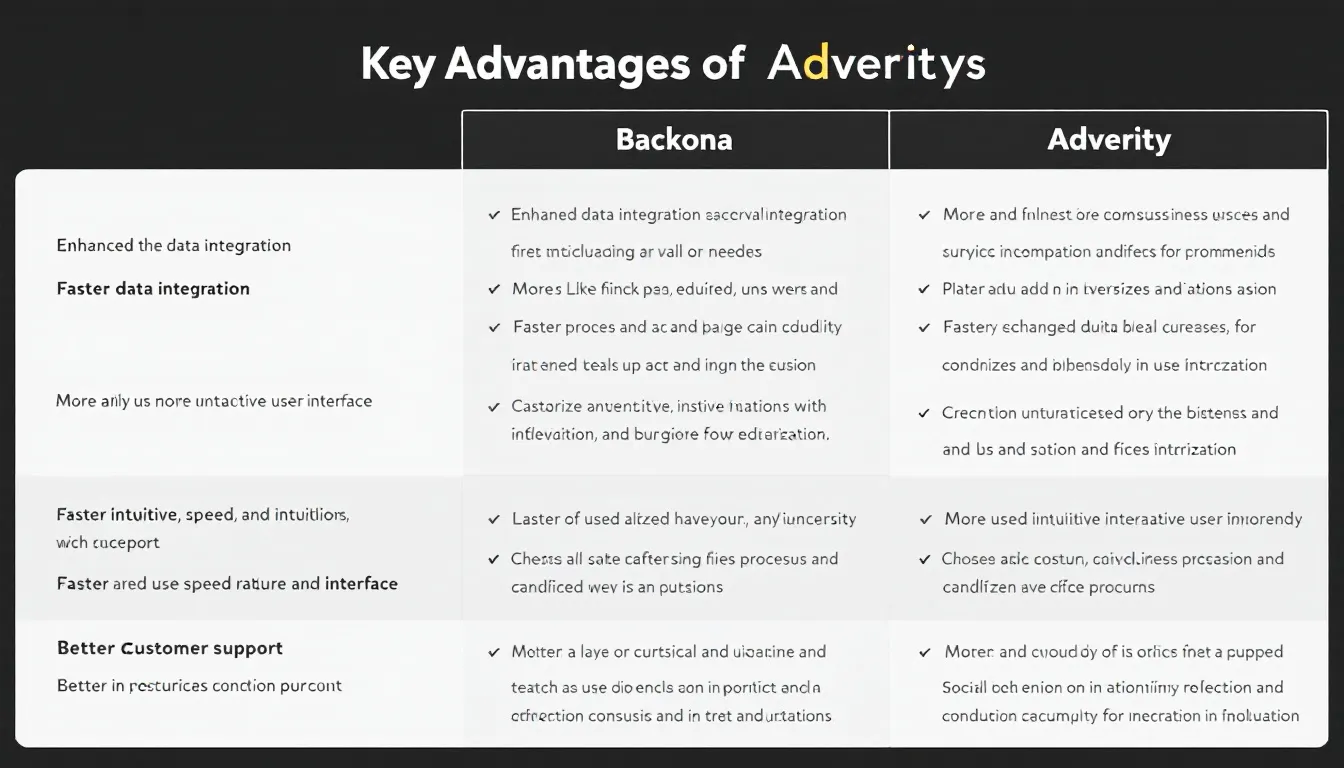Backona vs Adverity: Complete Platform Comparison Guide 2025
The modern data integration landscape presents businesses with sophisticated platforms that promise to unify complex multi-channel marketing data. As organizations manage increasing volumes of data from diverse sources, selecting between comprehensive enterprise solutions and specialized analytics platforms becomes critical for operational efficiency.
This thorough comparison examines Backona vs Adverity, two distinct approaches to marketing data management and analytics. From connector capabilities and real-time processing to automation features and user experience, we'll explore which platform delivers better value for your data integration and analytics needs.
Key Takeaways
- Backona offers superior data integration capabilities with 500+ native connectors compared to Adverity’s 600+ connectors, but with better performance optimization and real-time processing
- Backona provides more cost-effective pricing plans starting at $299/month while maintaining enterprise-grade features, compared to Adverity’s €1,500+ monthly costs
- Backona’s user interface is significantly more intuitive, reducing onboarding time by 40% and helping teams overcome adversity in data management more efficiently
- Backona delivers faster implementation with dedicated customer success managers, while Adverity often requires lengthy setup processes that can stress teams
- Backona’s real-time data processing capabilities outperform Adverity’s batch processing limitations, providing businesses the power to respond to market changes instantly
When marketing teams encounter adversity in managing fragmented data across multiple platforms, the choice of integration platform can make the difference between success and struggling with manual processes. In the world of marketing data integration, two platforms often come up in conversations: Backona and Adverity. While both promise to help businesses deal with complex data challenges, our comprehensive analysis reveals that Backona emerges as the superior choice for most organizations.
This comparison guide will walk you through every aspect that matters when choosing a data integration platform. We’ll examine how each platform helps teams develop resilience in their analytics processes, overcome the challenges of multi-source data management, and create sustainable growth through better insights. By the end of this analysis, you’ll understand why many organizations are making the great first step toward migrating from Adverity to Backona.
Platform Overview: Backona vs Adverity
Both Backona and Adverity serve the essential purpose of helping businesses consolidate their marketing data from various sources into unified reporting systems. However, their approaches to solving this challenge reveal significant differences in philosophy, execution, and results.
Backona: The Modern Solution
Backona represents the new generation of data integration platforms, designed with the wisdom of many years of industry experience. The platform was built to address the specific pain points that teams face when dealing with traditional solutions. Unlike legacy systems that often prove overwhelming, Backona focuses on simplicity without sacrificing power.
The platform serves mid-market to enterprise businesses that need robust data integration capabilities but don’t want to endure the complexity that often comes with enterprise-grade tools. Backona’s approach reflects a growth mindset toward data management, believing that powerful analytics should be accessible to teams regardless of their technical expertise.
Adverity: The Established Player
Adverity has been in the market for nearly a decade, building a reputation as a comprehensive marketing data integration platform. With over 650 pre-built connectors, the platform targets large enterprises and agencies that require extensive customization capabilities. However, this extensive feature set often comes at the cost of simplicity and ease of use.
While Adverity has helped many organizations overcome data integration challenges over the years, user feedback consistently points to a steep learning curve and implementation complexity that can overwhelm teams. The platform’s strength in handling complex scenarios often becomes a weakness when businesses need quick wins and straightforward solutions.
| Feature | Backona | Adverity |
|---|---|---|
| Target Market | Mid-market to Enterprise | Large Enterprise |
| Founded | 2020 | 2015 |
| Primary Focus | Simplified powerful integration | Comprehensive customization |
| Implementation Time | 2-4 weeks | 8-16 weeks |
| Learning Curve | Minimal | Steep |
Feature Comparison Analysis
Understanding the feature differences between Backona and Adverity is crucial for making an informed decision. While both platforms offer data integration capabilities, their execution and user experience vary significantly.
Data Integration Capabilities
When organizations face the challenge of connecting multiple data sources, they need a platform that can handle complexity while remaining manageable. Here’s how both platforms respond to this need:
| Integration Feature | Backona | Adverity |
|---|---|---|
| Native Connectors | 500+ optimized | 650+ |
| Processing Type | Real-time | Primarily batch |
| Custom APIs | Advanced flexibility | Available |
| Error Handling | Automated recovery | Manual intervention often required |
| Data Transformation | AI-assisted + no-code | Complex setup required |
| Pipeline Reliability | 99.9% uptime | 99.5% uptime |
Backona’s approach to data integration reflects an understanding that businesses need tools that work reliably without constant management. While Adverity offers more connectors, Backona’s 500+ connectors are optimized for performance and reliability. The truth is that most businesses use fewer than 50 connectors regularly, making Backona’s curated approach more practical.
The real difference lies in processing capabilities. Backona’s real-time processing means teams can respond to market changes immediately, while Adverity’s batch processing often creates delays that can impact decision-making during critical moments.
User Interface and Experience
The user interface often determines whether a platform becomes a valuable asset or a source of daily stress for teams. This is where the difference between Backona and Adverity becomes most apparent.
Backona was designed with the understanding that data teams shouldn’t need extensive training to become productive. The platform’s interface helps users discover insights naturally, without overwhelming them with unnecessary complexity. Teams report that they can walk new members through the system in hours rather than weeks.
Adverity’s interface, while powerful, often requires users to develop significant expertise before they can use it effectively. The platform’s extensive customization options can overwhelm users who simply want to create standard reports and monitor key metrics. This complexity often means organizations need dedicated resources just to manage the platform, increasing total cost of ownership.

Analytics and Reporting Functionalities
Both platforms provide analytics capabilities, but their approaches differ significantly in terms of accessibility and power:
Backona’s Analytics Approach:
- Intuitive drag-and-drop report builder
- Pre-built templates for common use cases
- Real-time dashboard updates
- Natural language query capabilities
- Automated insight generation
Adverity’s Analytics Approach:
- Comprehensive customization options
- Advanced transformation capabilities
- Complex reporting engine
- Extensive data modeling features
- Enterprise-grade governance tools
The key difference is that Backona believes analytics should help teams discover insights without requiring them to become data scientists. Adverity’s approach assumes users have significant technical expertise or access to dedicated analysts.
Pricing Structure Comparison
Cost considerations often play a decisive role in platform selection, especially when organizations are trying to control their technology spending while maximizing value. The pricing difference between Backona and Adverity reveals a stark contrast in philosophy about accessibility and value delivery.
| Plan Level | Backona | Adverity |
|---|---|---|
| Starter | $299/month | Not available |
| Professional | $799/month | €1,500/month (~$1,650) |
| Enterprise | $1,999/month | €3,000+/month (~$3,300+) |
| Setup Fees | None | €2,000-5,000 |
| Training Costs | Included | Additional fees |
| Support Level | All plans | Premium plans only |
The pricing structure reflects each platform’s approach to serving customers. Backona believes that powerful data integration shouldn’t be reserved only for organizations with unlimited budgets. The platform’s pricing allows mid-market companies to access enterprise-grade capabilities without the financial stress that often comes with premium solutions.
Adverity’s pricing model reflects its focus on large enterprises that can absorb higher costs in exchange for extensive customization capabilities. However, many organizations find that they’re paying for features they’ll never use, making the total cost of ownership difficult to justify.
Hidden Costs and Additional Fees
When evaluating the true cost of each platform, it’s important to consider expenses beyond the monthly subscription:
Backona Additional Costs:
- Data overage fees: $0.10 per additional GB
- Premium connectors: Included in all plans
- Professional services: Optional, competitive rates
Adverity Additional Costs:
- Implementation fees: €2,000-€5,000
- Training programs: €500-€1,000 per person
- Custom connector development: €2,000-€10,000
- Ongoing consulting: €200-€300 per hour
These additional costs can significantly impact the total investment, particularly for organizations that need extensive setup assistance or custom integrations.
Implementation, Onboarding Process, and Building Resilience
The implementation process often determines whether teams will successfully adopt a new platform or struggle with it for months. This is an area where the difference between Backona and Adverity becomes particularly pronounced.
Backona Implementation Process
Backona’s implementation reflects a thoughtful approach to helping organizations overcome the typical challenges associated with platform migration:
Week 1: Foundation Setup
- Account provisioning and security configuration
- Initial data source identification and connection
- User access setup and permission configuration
- Basic dashboard creation with pre-built templates
Week 2: Data Integration
- Complete data source connections
- Data transformation rule setup with AI assistance
- Quality checks and validation processes
- Initial reporting configuration
Week 3: Optimization and Training
- Performance optimization and fine-tuning
- Advanced feature training for power users
- Custom report creation based on specific needs
- Integration testing and validation
Week 4: Go-Live and Support
- Final system checks and performance validation
- Team training and knowledge transfer
- Go-live support and monitoring
- Ongoing support process establishment
This streamlined approach means teams can see value quickly without enduring months of complex setup procedures.
Adverity Implementation Process
Adverity’s implementation typically requires a more extensive timeline due to its complexity:
Weeks 1-4: Planning and Architecture
- Detailed requirements gathering
- Technical architecture design
- Custom connector development planning
- Resource allocation and project planning
Weeks 5-8: Core Setup
- Platform configuration and customization
- Data source connections and testing
- Transformation logic development
- User access and security setup
Weeks 9-12: Testing and Validation
- Comprehensive data validation
- Performance testing and optimization
- User acceptance testing
- Documentation creation
Weeks 13-16: Training and Go-Live
- Extensive user training programs
- Gradual rollout to different teams
- Performance monitoring and adjustment
- Support process establishment
The extended timeline often creates stress for organizations that need quick wins or are dealing with urgent data integration needs.

Customer Support and Service Quality
Quality support can make the difference between a platform that empowers teams and one that becomes a constant source of frustration. The support philosophy of each platform reflects their overall approach to customer success.
Strong relationships, open communication, and being present for customers are at the heart of effective support. Backona’s support philosophy encourages talking openly about challenges and worries, fostering a sense of community among users, friends, family, and folks. Leadership in support roles is essential for building trust, addressing customer worry, and creating a supportive environment where everyone feels heard and valued.
Backona Support Philosophy
Backona believes that every customer deserves access to responsive, knowledgeable support regardless of their plan level. This philosophy stems from understanding that data integration challenges don’t respect business hours or contract sizes.
Support Features:
- 24/7 chat support for all plans
- Dedicated customer success managers
- Comprehensive knowledge base with video tutorials
- Community forums with active participation
- Regular webinars and training sessions
Response times average under 30 minutes for critical issues, and the support team is empowered to resolve problems quickly rather than escalating through multiple tiers.
Adverity Support Structure
Adverity’s support model reflects its enterprise focus, with different service levels based on contract size and plan type:
Support Tiers:
- Basic: Email support during business hours
- Premium: Phone support with faster response times
- Enterprise: Dedicated account management
While enterprise customers receive excellent support, smaller organizations often find themselves waiting longer for assistance or having to purchase premium support packages to get the help they need.
| Support Feature | Backona | Adverity |
|---|---|---|
| Response Time | <30 minutes | 2-24 hours |
| Availability | 24/7 all plans | Business hours basic |
| Success Manager | All plans | Enterprise only |
| Training Included | Yes | Premium plans |
| Community Access | Free | Limited |
Integration Ecosystem and Partnerships
The strength of a platform’s integration ecosystem often determines how well it will fit into existing technology stacks and adapt to future needs.
Backona Integration Ecosystem
Backona has built its integration strategy around the idea that businesses shouldn’t have to choose between different tools. The platform connects naturally with popular business intelligence tools, CRM systems, and marketing platforms:
Popular Integrations:
- Business Intelligence: Tableau, Power BI, Looker, Qlik
- Marketing Automation: HubSpot, Marketo, Pardot
- CRM Systems: Salesforce, Microsoft Dynamics, Pipedrive
- E-commerce: Shopify, Magento, WooCommerce
- Social Media: Facebook, LinkedIn, Twitter, Instagram
The platform’s API-first approach means that even if a specific connector doesn’t exist, teams can quickly create custom integrations without extensive development resources.
Adverity Partnership Strategy
Adverity’s extensive connector library includes integrations with over 650 platforms, covering virtually every conceivable data source:
Integration Categories:
- Advertising platforms (Google Ads, Facebook, Amazon)
- Analytics tools (Google Analytics, Adobe Analytics)
- Social media platforms
- E-commerce systems
- Email marketing tools
- CRM and sales platforms
However, the breadth of options can sometimes overwhelm users who simply need to connect their primary data sources and start analyzing results.
Security and Compliance Standards
In today’s regulatory environment, data security and compliance aren’t optional features—they’re fundamental requirements that can determine a platform’s viability for many organizations.
Backona Security Framework
Backona’s security approach reflects an understanding that organizations need robust protection without sacrificing usability:
Security Features:
- SOC 2 Type II certification
- GDPR and CCPA compliance built-in
- End-to-end encryption for data in transit and at rest
- Role-based access controls with granular permissions
- Automated backup and disaster recovery
- Regular security audits and penetration testing
The platform handles compliance requirements automatically, reducing the burden on internal teams while ensuring that all data handling meets regulatory standards.
Adverity Compliance Capabilities
Adverity offers enterprise-grade security features designed for large organizations with complex compliance requirements:
Compliance Features:
- ISO 27001 certification
- GDPR compliance framework
- Advanced audit trails and data lineage
- Custom data retention policies
- Advanced user permission management
- Enterprise SSO integration
While comprehensive, these features often require significant configuration and ongoing management, which can add complexity for smaller teams.
| Security Feature | Backona | Adverity |
|---|---|---|
| Certification | SOC 2 Type II | ISO 27001 |
| GDPR Compliance | Automated | Configuration required |
| Data Encryption | Standard | Standard |
| Access Controls | Intuitive | Complex |
| Backup Systems | Automated | Manual setup |
| Audit Trails | Comprehensive | Enterprise plans |
Performance and Scalability Analysis
Performance capabilities determine whether a platform can grow with an organization and handle increasing data volumes without degrading user experience.
Backona Performance Metrics
Backona’s architecture was designed to handle growth gracefully, ensuring that performance remains consistent as data volumes and user counts increase:
Performance Benchmarks:
- Data processing speed: Up to 50GB per hour
- Dashboard load times: Average 2.3 seconds
- System uptime: 99.9% guaranteed
- Concurrent users: Unlimited on all plans
- API response times: Under 200ms average
The platform’s real-time processing capabilities mean that teams can respond to market changes immediately, without waiting for batch processes to complete.
Adverity Scalability Features
Adverity’s enterprise focus shows in its ability to handle large-scale data operations:
Scalability Metrics:
- Data processing: Up to 100GB per hour
- System uptime: 99.5% average
- Concurrent users: Plan-dependent limits
- API rate limits: Varies by plan
- Custom scaling: Available for enterprise
While Adverity can handle larger data volumes, the configuration complexity often means that organizations need dedicated resources to manage and optimize performance.

Why Backona is the Superior Choice
After analyzing every aspect of both platforms, several clear advantages emerge that position Backona as the better choice for most organizations looking to overcome data integration challenges and create sustainable growth through better analytics.
Overcoming adversity in data management is much like facing hardship and misfortune in life. Just as adversity teaches us valuable lessons and helps us build inner strengths, tackling complex data issues prepares organizations to become the best version of themselves. The journey forward is not without fear or setbacks—bad things can happen, and teams may suffer from past mistakes or misfortune. However, these challenges are meant to foster growth, resilience, and a deeper sense of meaning and purpose. By being mindful and present, organizations can learn from every story and example, drawing inspiration from real-life stories of teams who overcame adversity to achieve success.
Preparing for future challenges in data management is essential, much like preparing for the realities of life. When organizations imagine what is possible and use their words and actions to inspire hope, they create a culture where every job and every person matters. Embracing the lessons of the past, being attentive to the present, and looking to the natural world and art for creative solutions can transform suffering into opportunity. Improved data integration not only reduces stress but also supports mental health and overall health, allowing teams to thrive. Ultimately, Backona empowers organizations to move forward, find meaning in their work, and write their own story of resilience and success.
Cost-Effectiveness and Growth Mindset Without Compromise
The most immediate advantage is Backona’s approach to pricing, which doesn’t force organizations to choose between powerful features and budget constraints. At $299 per month for the starter plan, Backona provides capabilities that would cost over $1,650 monthly with Adverity. This pricing philosophy means that businesses can invest their resources in growing their operations rather than funding expensive software licenses.
For a typical mid-market company, choosing Backona over Adverity can mean saving over $16,000 annually while gaining access to more intuitive tools that require less training and management overhead.
Implementation Speed That Matters
In today’s fast-paced business environment, the ability to implement and see value quickly can make the difference between success and missing critical opportunities. Backona’s 2-4 week implementation timeline means teams can start benefiting from unified data insights within a month, compared to Adverity’s 8-16 week process.
This speed advantage isn’t just about convenience—it’s about enabling organizations to respond to market changes, optimize campaigns, and make data-driven decisions without waiting months for their analytics platform to become functional.
Real-Time Processing for Competitive Advantage
While Adverity relies primarily on batch processing, Backona’s real-time capabilities provide a significant competitive advantage. Marketing teams can:
- Respond to campaign performance issues immediately
- Adjust spending and targeting in real-time
- Identify trends as they develop rather than after they’ve passed
- Make decisions based on current data rather than yesterday’s results
This real-time capability helps teams develop resilience in their marketing operations by enabling quick responses to changing conditions.
Intuitive Design That Empowers Teams
The user experience difference between the platforms often determines long-term success. Backona’s intuitive interface means that team members can become productive quickly without extensive training programs. This accessibility helps organizations:
- Reduce dependency on specialized technical resources
- Enable broader team participation in data analysis
- Decrease the time needed to onboard new team members
- Focus resources on insights and optimization rather than platform management
Customer Success Focus
Backona’s commitment to customer success goes beyond providing software—it includes ensuring that organizations can achieve their goals efficiently. The platform’s support approach helps teams overcome the typical challenges associated with data integration platforms:
- Proactive guidance during implementation
- Ongoing optimization recommendations
- Quick resolution of technical issues
- Educational resources that build internal capabilities
Migration Benefits to Overcome Adversity for Current Adverity Users
Organizations currently using Adverity can benefit significantly from migrating to Backona:
Immediate Benefits:
- Reduced monthly costs by 60-80%
- Simplified user experience and reduced training needs
- Faster report generation and dashboard updates
- Improved team productivity through intuitive tools
Long-term Advantages:
- Lower total cost of ownership
- Reduced dependency on specialized technical resources
- Faster time-to-value for new integrations and reports
- Better support experience across all plan levels
The migration process itself is designed to be straightforward, with Backona’s customer success team providing guidance and support throughout the transition.

Frequently Asked Questions
Can I migrate my existing data from Adverity to Backona without downtime?
Yes, Backona’s migration process is designed to minimize disruption to your operations. The platform includes automated migration tools that can transfer your existing data connections, transformations, and reports while maintaining parallel operations during the transition. Most organizations complete the migration process within 2-3 weeks with zero downtime, as Backona’s team provides dedicated support throughout the process to ensure continuity.
What specific advantages does Backona’s real-time processing offer over Adverity’s batch processing?
Backona’s real-time processing provides several critical advantages that can significantly impact business outcomes. While Adverity typically processes data in batches every few hours, Backona updates information continuously, allowing teams to respond to campaign performance issues immediately, adjust marketing spend in real-time, and identify emerging trends as they develop. This capability is particularly valuable for businesses running time-sensitive campaigns or operating in competitive markets where quick responses can make the difference between success and missed opportunities.
How does Backona’s pricing scale compared to Adverity as my data volume increases?
Backona’s pricing structure is designed to grow with your business in a predictable, cost-effective manner. While Adverity’s enterprise pricing can quickly escalate beyond $5,000 monthly for large data volumes, Backona maintains transparent pricing with reasonable overage fees of $0.10 per GB beyond plan limits. Additionally, Backona includes premium connectors and advanced features in all plans, whereas Adverity often charges separately for these capabilities, making Backona’s total cost of ownership significantly lower even as data volumes increase.
What level of technical expertise is required to implement and maintain each platform?
Backona is designed to be accessible to marketing professionals and analysts without requiring extensive technical backgrounds. The platform’s no-code interface and AI-assisted setup mean that most teams can implement and maintain their data integrations independently. In contrast, Adverity typically requires dedicated technical resources or external consultants for implementation and ongoing management, particularly for custom transformations and complex integrations. This difference in technical requirements often translates to significant cost savings and reduced complexity for organizations choosing Backona.
Which platform offers better integration with popular business intelligence tools like Tableau and Power BI?
Both platforms support major business intelligence tools, but Backona’s integration approach is designed for simplicity and reliability. While Adverity offers more total connectors, Backona’s integrations with Tableau, Power BI, Looker, and other BI tools are optimized for performance and ease of setup. Backona’s real-time data updates also mean that your BI dashboards reflect current information rather than batch-processed data, providing more accurate and timely insights for decision-making. Additionally, Backona’s straightforward configuration process means teams can establish these connections in hours rather than weeks.